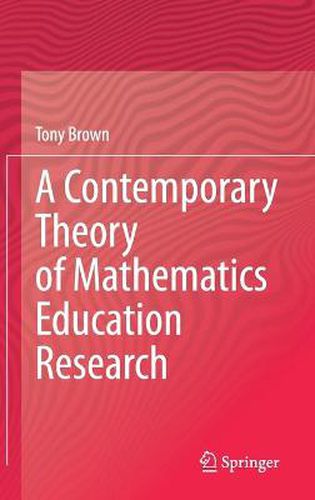Readings Newsletter
Become a Readings Member to make your shopping experience even easier.
Sign in or sign up for free!
You’re not far away from qualifying for FREE standard shipping within Australia
You’ve qualified for FREE standard shipping within Australia
The cart is loading…






This title is printed to order. This book may have been self-published. If so, we cannot guarantee the quality of the content. In the main most books will have gone through the editing process however some may not. We therefore suggest that you be aware of this before ordering this book. If in doubt check either the author or publisher’s details as we are unable to accept any returns unless they are faulty. Please contact us if you have any questions.
This book by-passes both psychology and sociology to present an original social theory centered on seeing mathematical learning by everyone as an intrinsic dimension of how mathematics develops as a field in support of human activity. Here, mathematics is defined by how we collectively talk about it. Drawing on psychoanalytic theory, the student is seen as participating in the renewal of mathematics through their contributions to our collective gaze on mathematics as the field responds to ever new demands. As such learning takes a critical stance on the standard initiations into current practices often promoted by formal education. In the field of mathematics education, researchers have moved from psychology where individual students were seen as following natural paths of development through existing mathematical knowledge, to socio-cultural models predicated on students being initiated into the human world and understood through the reflective gazes this world has of itself, such as those found in comparisons of student learning in different countries. This book addresses the domain, purpose and functioning of contemporary research in mathematics education and is an original contribution to this theme. The book is aimed at a mathematics education research audience. It continues a dialogue with existing publications, seen widely as a cutting edge and will also be of interest to students and practitioners in the fields of qualitative research, social theory and psychology.
$9.00 standard shipping within Australia
FREE standard shipping within Australia for orders over $100.00
Express & International shipping calculated at checkout
This title is printed to order. This book may have been self-published. If so, we cannot guarantee the quality of the content. In the main most books will have gone through the editing process however some may not. We therefore suggest that you be aware of this before ordering this book. If in doubt check either the author or publisher’s details as we are unable to accept any returns unless they are faulty. Please contact us if you have any questions.
This book by-passes both psychology and sociology to present an original social theory centered on seeing mathematical learning by everyone as an intrinsic dimension of how mathematics develops as a field in support of human activity. Here, mathematics is defined by how we collectively talk about it. Drawing on psychoanalytic theory, the student is seen as participating in the renewal of mathematics through their contributions to our collective gaze on mathematics as the field responds to ever new demands. As such learning takes a critical stance on the standard initiations into current practices often promoted by formal education. In the field of mathematics education, researchers have moved from psychology where individual students were seen as following natural paths of development through existing mathematical knowledge, to socio-cultural models predicated on students being initiated into the human world and understood through the reflective gazes this world has of itself, such as those found in comparisons of student learning in different countries. This book addresses the domain, purpose and functioning of contemporary research in mathematics education and is an original contribution to this theme. The book is aimed at a mathematics education research audience. It continues a dialogue with existing publications, seen widely as a cutting edge and will also be of interest to students and practitioners in the fields of qualitative research, social theory and psychology.